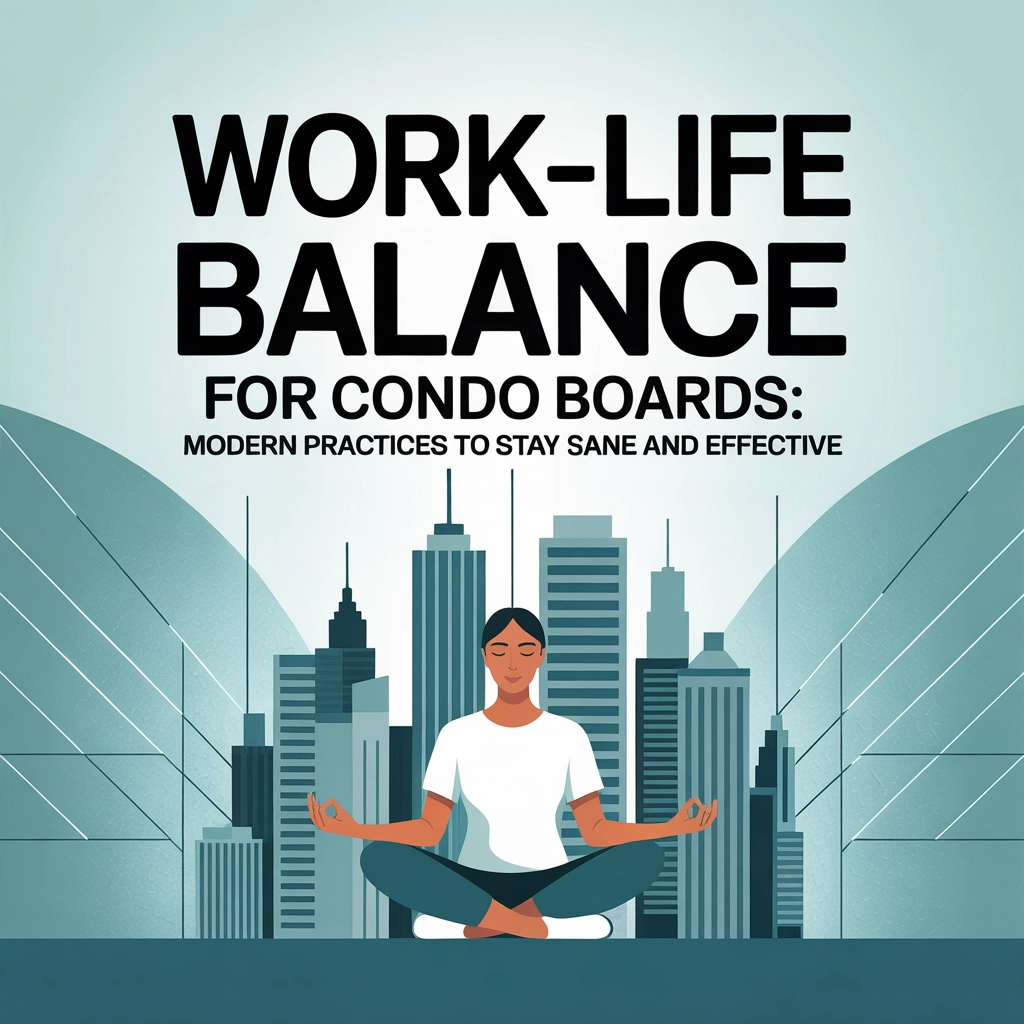Condo board members wear a lot of hats. They juggle work, family, and their volunteer roles—sometimes all in the same day. Without the right support or boundaries, it’s easy to burn out. But today’s technology and smarter, more empathetic management practices can help you keep your cool, protect your downtime, and run a smoother community at the same time. Here’s how forward-thinking boards are making it happen.
Set Clear Boundaries: Protecting Your Time and Residents’ Expectations
The lines between board work and personal time can blur, especially with after-hours emails, late-night repair calls, and urgent resident concerns. That’s why setting boundaries is not just self-care; it’s good governance.
One easy win: set up auto-response messages for your board’s email or phone line after business hours. This reassures residents that their inquiries are received but sets expectations for when they’ll hear back. For example, your auto-reply might say:
“Thanks for reaching out to the board! Our regular hours are 9:00 a.m. to 5:00 p.m. Monday–Friday. We’ll respond as soon as possible during those hours. If this is a building emergency (e.g., fire, flood), please call [emergency number].”
This simple step helps your board disconnect, reduces repeat follow-ups, and directs true emergencies to the right place.
Compartmentalization is another powerful tool. Dedicate regular, predictable time blocks for board work and meetings—maybe a standing evening once a month, or one lunch break a week for board tasks. Let owners know your communication policy: what’s urgent, what isn’t, and which channels to use for each. Consistency here trains your community to respect your time while helping you keep control of your schedule.

Lean on Technology and Streamlined Processes
Why do things the hard way when there’s tech to make it easy? Today’s software solutions are tailor-made for busy boards:
- Digital document sharing: Use secure drives or board management platforms to store minutes, financials, and policies, making it simple for members (and auditors) to find what’s needed instantly.
- Collaborative tools: Switch from unending email chains to discussion boards or project management apps. This keeps discussion focused and avoids lost or duplicated work.
- Automated work orders: Modern property management systems can route maintenance requests, track progress, and update residents automatically, freeing up your inbox for the important stuff.
Review your condo’s processes yearly. Are there repeated bottlenecks or “time sucks” that could be solved with automation, clearer forms, or a tweak to your by-laws? Small changes can mean big savings in stress and time.
Prioritize and Delegate: Focus Where It Counts
Not every issue deserves the same attention. Effective boards ruthlessly prioritize according to critical impact—on safety, finances, or resident well-being. Use simple triage:
- High-priority: Building system failures, legal notices, security threats.
- Medium-priority: Upcoming AGMs, budget reviews, resident complaints with no safety risk.
- Low-priority: Suggestions for community BBQs, minor landscaping tweaks.
Set up a “decision matrix” or checklist for new issues so you aren’t constantly re-litigating what’s minor and what’s urgent.
Equally vital: delegate. Encourage committee participation and split up board tasks to match members’ strengths. Tap qualified managers (or trusted vendors) for specialized tasks that suck up too much of the board’s time. And when a project is outside your wheelhouse—for example, special assessments or legal disputes—don’t be afraid to call in the pros.

Define Rules of Engagement: Communication That Works
Communication can make (or break) your board’s success and sanity. Modern boards agree on rules of engagement:
- Set “quiet hours” or blackout periods with no board communication (especially for non-urgent matters).
- Define preferred channels: Reserve text/phone calls for emergencies, emails for routine communication, and shared workspaces for document discussion.
- Expect (and model) professional responses—timely, clear, and solution-focused.
When everyone knows the playbook, your team works better and you avoid misunderstandings. And if someone needs to “tap out” due to travel, illness, or life’s curveballs, a quick heads-up keeps the board moving forward without a hitch.
Embrace Flexibility and Support Each Other
Sometimes, things just get busy—big projects, emergency repairs, or those fun special assessments. The key isn’t to avoid crunch times entirely (impossible!), but to balance them with periods of lighter lift.
- Rotate major duties each year, so no one is always stuck with the hard jobs.
- Offer support when another member’s plate is overloaded, just as you’d want in return.
- Use relief periods to recharge. After an intense AGM or months managing a big repair, agree on a few “no new projects” weeks whenever possible.
This culture of teamwork and moderation helps boards stay functional—and friendly—even in tough times.

Make Self-Care Mandatory (Not Optional)
It’s easy to tell yourself, “It’s just a volunteer job, I’ll power through.” But burnouts don’t help anyone, least of all your community. Regular self-care is essential:
- Schedule exercise, downtime, family time, and stick to it.
- Take breaks—real ones—after major board milestones.
- Periodically “audit” your own balance; are you feeling run down or fulfilled? If you’re overwhelmed, consider taking a temporary hiatus or stepping down—a healthy board has sustainable member turnover.
Mental health matters for volunteers as much as for paid professionals. Speak openly with your fellow board members about stress, seek help if needed, and encourage an atmosphere where it’s OK not to be “on” all the time.

Reassess and Adjust: Balance Is a Moving Target
Work-life balance for condo boards isn’t a one-and-done project. As your building, board, and personal lives evolve, so should your approach. Regularly check in as a team: Are current systems working? Has anyone been taking on too much? Are residents’ expectations clear—and are they realistic?
Being open to change—and correcting course when burnout or inefficiency sets in—keeps your leadership fresh and your community thriving.
Condo governance doesn’t have to mean sacrificing your nights, weekends, or sanity. By setting modern boundaries, leveraging technology, prioritizing what matters, and taking care of yourselves and each other, condo boards can serve their communities well and lead happier, more balanced lives.
If you need help streamlining your building’s communication, processes, or want advice on setting up technology for your board, reach out to the experts at GIA Property Management. We’re here to help keep you effective—and sane.


